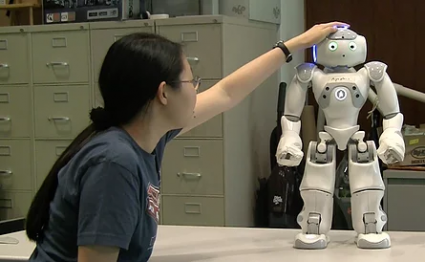
Robohub.org
324
Embodied Interactions: from Robotics to Dance with Kim Baraka


In this episode, our interviewer Lauren Klein speaks with Kim Baraka about his PhD research to enable robots to engage in social interactions, including interactions with children with Autism Spectrum Disorder. Baraka discusses how robots can plan their actions across multiple modalities when interacting with humans, and how models from psychology can inform this process. He also tells us about his passion for dance, and how dance may serve as a testbed for embodied intelligence within Human-Robot Interaction.
Kim Baraka
 Kim Baraka is a postdoctoral researcher in the Socially Intelligent Machines Lab at the University of Texas at Austin, and an upcoming Assistant Professor in the Department of Computer Science at Vrije Universiteit Amsterdam, where he will be part of the Social Artificial Intelligence Group. Baraka recently graduated with a dual PhD in Robotics from Carnegie Mellon University (CMU) in Pittsburgh, USA, and the Instituto Superior Técnico (IST) in Lisbon, Portugal. At CMU, Baraka was part of the Robotics Institute and was advised by Prof. Manuela Veloso. At IST, he was part of the Group on AI for People and Society (GAIPS), and was advised by Prof. Francisco Melo.
Kim Baraka is a postdoctoral researcher in the Socially Intelligent Machines Lab at the University of Texas at Austin, and an upcoming Assistant Professor in the Department of Computer Science at Vrije Universiteit Amsterdam, where he will be part of the Social Artificial Intelligence Group. Baraka recently graduated with a dual PhD in Robotics from Carnegie Mellon University (CMU) in Pittsburgh, USA, and the Instituto Superior Técnico (IST) in Lisbon, Portugal. At CMU, Baraka was part of the Robotics Institute and was advised by Prof. Manuela Veloso. At IST, he was part of the Group on AI for People and Society (GAIPS), and was advised by Prof. Francisco Melo.
Dr. Baraka’s research focuses on computational methods that inform artificial intelligence within Human-Robot Interaction. He develops approaches for knowledge transfer between humans and robots in order to support mutual and beneficial relationships between the robot and human. Specifically, he has conducted research in assistive interactions where the robot or human helps their partner to achieve a goal, and in teaching interactions. Baraka is also a contemporary dancer, with an interest in leveraging lessons from dance to inform advances in robotics, or vice versa.
- Download mp3 (13.7 MB)
- Subscribe to Robohub using iTunes, RSS, or Spotify
- Support us on Patreon
PS. If you enjoy listening to experts in robotics and asking them questions, we recommend that you check out Talking Robotics. They have a virtual seminar on Dec 11 where they will be discussing how to conduct remote research for Human-Robot Interaction; something that is very relevant to researchers working from home due to COVID-19.
tags: c-Research-Innovation, Culture and Philosophy, cx-Arts-Entertainment, cx-Research-Innovation, human-robot interaction, humanoid, Manipulation, podcast, Research, Robotics technology


